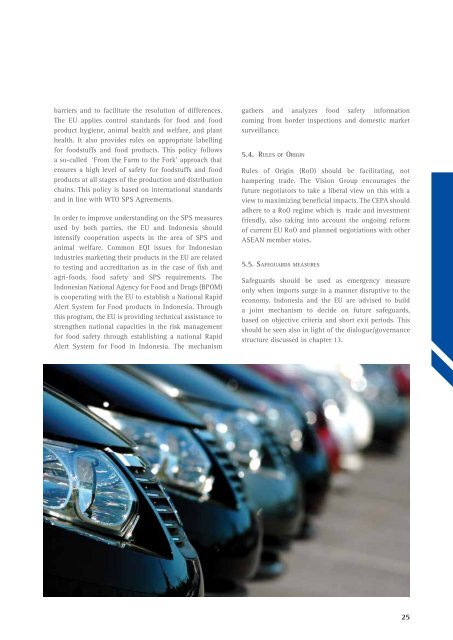Vision Group Report: Invigorating the Indonesia-EU Partnership
Vision Group Report: Invigorating the Indonesia-EU Partnership
Vision Group Report: Invigorating the Indonesia-EU Partnership
Create successful ePaper yourself
Turn your PDF publications into a flip-book with our unique Google optimized e-Paper software.
arriers and to facilitate <strong>the</strong> resolution of differences.<br />
The <strong>EU</strong> applies control standards for food and food<br />
product hygiene, animal health and welfare, and plant<br />
health. It also provides rules on appropriate labelling<br />
for foodstuffs and food products. This policy follows<br />
a so-called ‘From <strong>the</strong> Farm to <strong>the</strong> Fork’ approach that<br />
ensures a high level of safety for foodstuffs and food<br />
products at all stages of <strong>the</strong> production and distribution<br />
chains. This policy is based on international standards<br />
and in line with WTO SPS Agreements.<br />
In order to improve understanding on <strong>the</strong> SPS measures<br />
used by both parties, <strong>the</strong> <strong>EU</strong> and <strong>Indonesia</strong> should<br />
intensify cooperation aspects in <strong>the</strong> area of SPS and<br />
animal welfare. Common EQI issues for <strong>Indonesia</strong>n<br />
industries marketing <strong>the</strong>ir products in <strong>the</strong> <strong>EU</strong> are related<br />
to testing and accreditation as in <strong>the</strong> case of fish and<br />
agri-foods, food safety and SPS requirements. The<br />
<strong>Indonesia</strong>n National Agency for Food and Drugs (BPOM)<br />
is cooperating with <strong>the</strong> <strong>EU</strong> to establish a National Rapid<br />
Alert System for Food products in <strong>Indonesia</strong>. Through<br />
this program, <strong>the</strong> <strong>EU</strong> is providing technical assistance to<br />
streng<strong>the</strong>n national capacities in <strong>the</strong> risk management<br />
for food safety through establishing a national Rapid<br />
Alert System for Food in <strong>Indonesia</strong>. The mechanism<br />
ga<strong>the</strong>rs and analyzes food safety information<br />
coming from border inspections and domestic market<br />
surveillance.<br />
5.4. rUles of orIGIn<br />
Rules of Origin (RoO) should be facilitating, not<br />
hampering trade. The <strong>Vision</strong> <strong>Group</strong> encourages <strong>the</strong><br />
future negotiators to take a liberal view on this with a<br />
view to maximizing beneficial impacts. The CEPA should<br />
adhere to a RoO regime which is trade and investment<br />
friendly, also taking into account <strong>the</strong> ongoing reform<br />
of current <strong>EU</strong> RoO and planned negotiations with o<strong>the</strong>r<br />
ASEAN member states.<br />
5.5. safeGUards MeasUres<br />
Safeguards should be used as emergency measure<br />
only when imports surge in a manner disruptive to <strong>the</strong><br />
economy. <strong>Indonesia</strong> and <strong>the</strong> <strong>EU</strong> are advised to build<br />
a joint mechanism to decide on future safeguards,<br />
based on objective criteria and short exit periods. This<br />
should be seen also in light of <strong>the</strong> dialogue/governance<br />
structure discussed in chapter 13.<br />
25

















